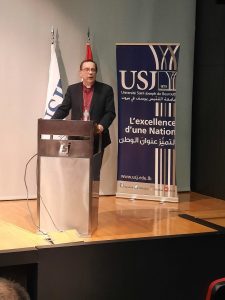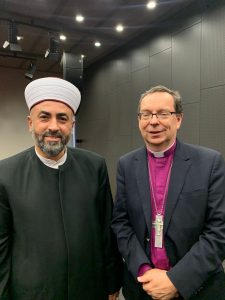Lebanon: FoRB and Climate Change
Thursday evening saw the central event of my visit here, as I gave a lecture at St Joseph’s University, jointly sponsored by the Middle East Council of Churches and the Bible Society. It was attended by diplomats and leaders of many faith groups and civil society organisations, and concluded with some excellent Lebanese hospitality.
A member of the team from the Christian environment agency A Rocha, who run a project up in the Beqaa Valley, asked me to expand on some comments I’d made about Freedom of Religion or Belief (FoRB) and climate change.
I had said that there are two current existential global threats to human flourishing and harmonious communities in the world today. One is climate change and the other one is the systematic denial of Freedom of Religion or Belief, in different places and in many different ways. While we’ve begun to realise the importance of addressing climate change, it’s high time now that we recognise the important of addressing the second.
But in answer to the question I suggested they may be even more connected than that – and in two ways.
 First it is evident that – while climate change is produced by the emissions of developed nations – it is the world’s poor who will suffer the most, through increased water shortages, extreme weather events, food insecurity and mass people movements, so name just some of the impacts. And in just the same way it is the world’s poor who are most vulnerable to the key drivers of FoRB violations: rising fundamentalism; militant nationalism and increasing authoritarianism. So if we care for the world’s poor we should certainly care about both these issues. Both of them pose serious threats to them.
First it is evident that – while climate change is produced by the emissions of developed nations – it is the world’s poor who will suffer the most, through increased water shortages, extreme weather events, food insecurity and mass people movements, so name just some of the impacts. And in just the same way it is the world’s poor who are most vulnerable to the key drivers of FoRB violations: rising fundamentalism; militant nationalism and increasing authoritarianism. So if we care for the world’s poor we should certainly care about both these issues. Both of them pose serious threats to them.
And here is my second reason: only states with a heart for the common, global good – a good beyond themselves, rather than their own self-aggrandizement – are going truly to care about both these issues. Put bluntly I doubt either Kim Jong-Un of North Korea or the Taliban are that concerned about climate change – and they certainly don’t care about FoRB. But action on FoRB and action on climate change have common roots and spring from a common concern for the common good: thus promoting one will inevitably help the other. Both are about the proper re-balancing of a world badly out of kilter. It’s about our determining to seek the common good for the health and welfare both of the planet and of all humanity. The last few years have been bad globally for democracies and good for autocracies – and it no surprise therefore that those years have been bad too both for the planet and for FoRB. It is a sad fact that the past decade has seen a significant rise in both CO2 emissions and persecution in the world’s two most populous countries: India and China. That, I suggest, is no coincidence. I’m not saying there is a causal relationship between the two. But I do believe there’s a moral relationship between them.
If we want to be engaged global citizens in today’s world let’s not commit the grave error of choosing between these two serious issues, but give them both the attention they, and those who suffer through them, deserve.
